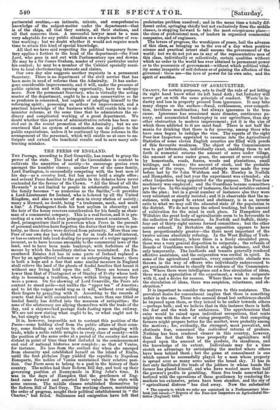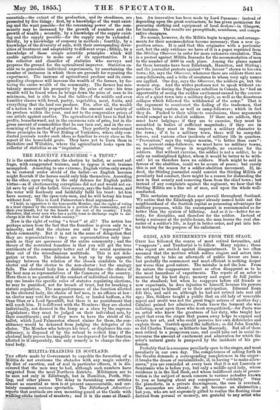THE REPORT OF AGRICULTURE.
Casitrrv, for certain purposes, sets to itself the rule of not letting its right hand know what its left hand Both; but Industry will never get on with the same principle of conduct. Waste in in- dustry and loss in property proceed from ignorance. It may take many shapes on the surface—fraud, recklessness, over-competi- tion, invidious machination ; but always ignorance is the true cause. Ignorance has occasioned more disaster, continuous pe- nury, and accumulated bankruptcy in our agriculture, than any other obstruction to modern improvement ; yet it is the vice of which those addicted to it are most fond. There is not half the mania for drinking that there is for ignoring, among those who have once begun to indulge the vice. The reports of the eight Poor-law Inspectors appointed to examine into the Agricultural Statistics of some eleven English counties are filled with proofs of this favourite weakness. The object of the Commissioners was to get information, individually exact, enabling them to set forth in numerial returns the amount of acres under tillage, the amount of acres under grass, the amount of acres occupied by homesteads, roads, fences, woods and plantations, small holdings, and wastes; the amount of stock, and- the probable produce of the crops. Successful attempts were made the year before last by Sir John Walsh= and Mr. Hawley in Norfolk and Hampshire, and last year the experiment was extended ; six other Inspectors being appointed• for the purpose. The Poor-law machinery was employed ; and the Guardians became committees pro has vice. In the majority of instances, the local notables entered into the plan; but in a great number of instances also they were very reluctant or stoutly resisted ; and, it is observable that the re- sistance, with regard to extent and obstinacy, is in an inverse ratio to what we may call the educated state of the population in the district. We do not mean the school teaching, but the amount of cultivation for the mind in each place. In Hampshire and Wiltshire the great body of agriculturists seem to be favourable to the collection of the information. In Norfolk and Suffolk, thirty- four out of thirty-eight unions formed committees ; but the other unions refused. In Berkshire the opposition appears to have been proportionately greater—the three most important of the twelve unions absolutely refusing. In the West Riding of York- shire, on the contrary, where there is a freely circulated press, there was a very general disposition to cooperate ; the refusals of Boards of Guardians were limited to a single instance, and that only temporarily. The landlords and tenants generally rendered effective assistance, and the cooperation was cordial in spirit. In some of the agricultural counties, every, conceivable obstacle was thrown in the way of officers who individually endeavoured to get proximate returns to classify the evidence of the Commission- ers. Where there were intelligence and a free circulation of ideas, there was an appreciation of the experiment, a wish to cooperate with it, and a desire for success. Where there was no means for the circulation of ideas, there was suspicion, reluctance, and ob- struction.'
It is important to consider the motives to this resistance. The prevalent desire for concealment implies that there is something unfair in the case. Those who conceal dread lest unfairness should be imposed upon them, or they intend to be unfair towards others —perhaps both ; and we believe that in this instance there is both the fear and the wish for unfairness. The apprehensions that rates would be raised upon individual occupations, that rents might rise with the show of rising prosperity, or that competing farmers might prepare better for the market, were probably among the motives ; for, evidently, the strongest, most prevalent, and obstinate fear, concerned the individual returns of produce. Nothing has been rendered clearer in this country, however, than the fact that the true prosperity of agriculture will depend upon the amount of the produce, its steadiness, and the knowledge of its extent. Individuals may for a time snatch an advantage by anticipating the market where others have been behind them ; but the game at concealment is one which cannot be successfully played by a man whose property is spread over so many acres under the broad sky. It has in fact only facilitated the trade of the jobbers in whose hands the farmer has placed himself, and who have wasted more than half the grower's profits in gambling. Since free trade somewhat in- terfered with the operations of these gentlemen by rendering the markets too extensive, prices have been steadier, and the cry of "agricultural distress' has died away. Now the substantial * The reports to which we refer are contained in a Parliamentary blue- book just issued—" Reports of the Poor-law Inspectors on Agricultural Sta- tistics (England) 1854."
essentials—the extent of the production, and its steadiness, are promoted by five things : first, by a knowledge of the want exist-
ing and the want increased the consuming power of the com- munity may be ncreased by the growth of numbers and the growth of wealth ; secondly, by a knowledge of the supply exist- ing and the supply possible—for the supply may be extended ; thirdly, by a knowledge of economy in methods ; fourthly, by a knowledge of the diversity of soils, with their corresponding diver- sities of treatment and adaptability to different crops ; fifthly, by a knowledge of those simple scientific principles which- will enable agriculture to make use of its opportunities. It is the collector and classifier of statistics who surveys and prepares the ground for the agricultural improver. Statistics en- able us to generalize individual experiments, by ascertaining the number of instances in which there are grounds for repeating the experiment. The increase of agricultural produce and its corre- sponding cheapness will increase the wealth of the farmer, by fos- tering the entire wealth of the community. The farmer has mis- takenly measured his prosperity by the price of corn : his true wealth will be found when he brings down the price of corn to its minimum, but is able to load the tables of the middle and even humbler classes with bread, pastry; vegetables, meat, fruits, and everything that the land can produce. For, after all, the wealth of a nation is exactly proportioned to the amount and variety of its produce within the year, and not to the comparative prices of one article against another. The agriculturist will have to find his profits, henceforward, not in the enormous rate of price, but in the gross amount of commodities that he can turn out, and in the eco- nomizing of his method of production.. They perfectly understand these principles in the West Riding of Yorkshire, where ably-con- ducted journals render such ideas as familiar to every class as the aspect of the household grate. They have yet to learn them in Berkshire and Wiltshire, where the agriculturist looks upon the collector of statistics as an " inquisitor.'



































 Previous page
Previous page